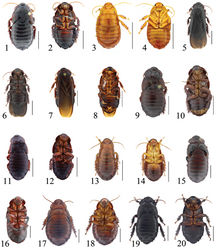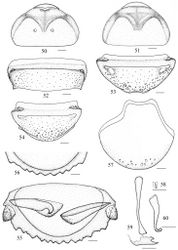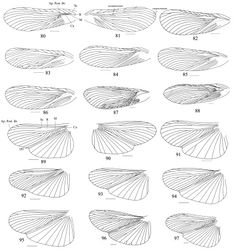Salganea incerta
| Notice: | This page is derived from the original publication listed below, whose author(s) should always be credited. Further contributors may edit and improve the content of this page and, consequently, need to be credited as well (see page history). Any assessment of factual correctness requires a careful review of the original article as well as of subsequent contributions.
If you are uncertain whether your planned contribution is correct or not, we suggest that you use the associated discussion page instead of editing the page directly. This page should be cited as follows (rationale):
Citation formats to copy and paste
BibTeX: @article{Wang2014ZooKeys412, RIS/ Endnote: TY - JOUR Wikipedia/ Citizendium: <ref name="Wang2014ZooKeys412">{{Citation See also the citation download page at the journal. |
Genus: Salganea
Name
Salganea incerta (Brunner von Wattenwyl, 1893) – Wikispecies link – Pensoft Profile
- Panesthia incerta Brunner von Wattenwyl, 1893: 50.
- Salganea incerta, Roth 1979[1]: 73, type species by lectotype.
Description
Male. Body reddish brown, darker caudally (Fig. 11). Eyes blackish brown; ocelli yellowish. Antennae, upper lip, mandible, labial palpi and maxillary palpomeres reddish brown and only a little paler than body. Legs reddish brown, paler on coxae and trochanter. Abdominal sternites reddish brown with the middle of the former two sternites brown (Fig. 12).
Face sparsely punctate and vertex exposed. Anterior margin of pronotum slightly concave mesially, with a small tubercle on each side of the excision; anterior half slightly depressed, the floor with sparse pustules; few punctations on posterior half, with a pair of small tubercles (Fig. 50). Tegmina and wings extending beyond the end of abdomen, sometimes mutilated (Fig. 11). Radial vein of tegmen with 1 forked posterior branch at base, or with 2 simple posterior branches; median vein branched before the midline (Figs 85–86). Radial vein of hind wing simple and branched apically, or with 3 small branches which terminate in the anterior apical angle; median vein branched; cubitus with 5 complete branches, which may be forked or not, and 7–8 incomplete branches (Figs 94–95). Anteroventral margin of front femur armed with 1 spine or unarmed, with or without a minute distal spine, hind margin with a distal spine. Abdominal tergites 1–6 sparsely punctate; T7 denser punctulated caudally, lateral margin weakly crenulate, laterocaudal angle slightly produced (Fig. 52); anterolateral corners with small holes in T6 and T7, some minute and indistinct in T5. Abdominal sternites punctulate, the last sternite densely punctuated and hind margin indented (Fig. 53). Supra-anal plate densely punctate, hind margin varied with 9–13 triangular teeth, border of teeth smooth or crenulate (Figs 55–56). Cercus conical, with few setae near the border dorsally and ventral surface setose (Fig. 55). Anterior margin of subgenital plate slightly concave, lateral margins slightly curved (Fig. 57). Male genitalia. L1 reduced, only two small lobes remained (Fig. 58); L2d forked apically and apex acute (Fig. 59); R2 hook-shaped, with weak hook portion and the apex not curved upwards (Fig. 60).
Female. Differs from male as follows: anterior margin of pronotum smooth or indented mesially and the tubercles absent or weakly indicated (Fig. 51); hind margin of S7 entire (Fig. 54).
Nymph. Body brown, darker caudally (Figs 13–14), the depression of pronotum punctate.
Measurements
Male, 3th–5th maxillary segments: 0.36–0.59/0.64–0.78/0.90–0.94mm; pronotum: length × width: 3.6–5.2 × 6.5–8.7mm; distance between disc tubercles: 1.4–2.2mm; tegmen: 24.0–26.5mm; body length: 17.7–26.2mm; fore leg: coxae: 1.53–2.29mm, trochanter: 1.65–1.86mm, femur: 2.81–3.19mm, tibia: 1.37–1.55mm, 1st–5th tarsus: 0.34–0.63/0.17–0.20/0.19–0.23/0.24–0.29/1.00–1.18mm; mid leg: coxae: 2.22–2.51mm, trochanter: 2.12–2.58mm, femur: 4.48–4.90mm, tibia: 3.73–3.79mm, 1st–5th tarsus: 0.76–0.99/0.22/0.23/0.26–0.30/1.00–1.03mm; hind leg: coxae: 2.02–2.84mm, trochanter: 2.34–2.56mm, femur: 4.43–5.16mm, tibia: 5.43–5.91mm, 1st–5th tarsus: 1.02–1.20/0.25–0.32/0.26–0.28/0.30–0.32/1.12–1.17mm; cerci: 0.73–0.89mm.
Female, 3th–5th maxillary segments: 0.70–0.74/0.59–0.66/0.96–0.99mm; pronotum: length × width: 4.4–5.8 × 7.6–9.1mm; body length: 20.0–27.0mm; fore leg: coxae: 2.27–2.54mm, trochanter: 1.68–1.93mm, femur: 3.52–3.54mm, tibia: 1.64–2.00mm, 1st–5th tarsus: 0.54–0.56/0.16–0.21/0.20–0.26/0.27–0.30/1.10–1.17mm; mid leg: coxae: 2.34–3.02mm, trochanter: 1.63–1.99mm, femur: 4.67–4.75mm, tibia: 4.25–4.46mm, 1st–5th tarsus: 1.08–1.11/0.29–0.30/0.25/0.30–0.31/1.01–1.13mm; hind leg: coxae: 2.11–2.51mm, trochanter: 2.01–2.30mm, femur: 5.02–5.60mm, tibia: 6.04–6.19mm, 1st–5th tarsus: 1.02–1.17/0.30–0.34/0.27–0.28/0.32–0.33/1.00–1.13mm; cerci: 0.54–0.94mm.
Material examined
Two males, Guangxi Prov., Jinxiu County, Mt. Yangjiaoshan, 25 September 1981, collector unknown; one male and two females, Chongqing, Mt. Simianshan, Dawopu, 11 July 2008, coll. Zongqing Wang; one male and one female, Sichuan Prov., Hongya County, Mt. Wawushan, 30 June 2013, coll. Yang Li and Jinjin Wang; one male, Yunnan Prov., Yingjiang County, 1418m, 24°61'N, 97°62'E, 4–5 June 2008, coll. Weiwei Zhang; two males, Yunnan Prov., Yingjiang County, Xima Township, Menglaihe River 2nd Hydroelectric Power Station, 1470m, 24°78.404'N, 97°67.493'E, 27–29 May 2009, coll. Weiwei Zhang; two males, Yunnan Prov., Yingjiang County, Xima Township, Menglaihe 2nd Hydroelectric Power Station, 1470m, 6–9 June 2008, coll. Weiwei Zhang; two males, Yunnan Prov., Yingjiang Country, Taiping Town, Longpen Village, 30 May-9 June 2009, coll. Weiwei Zhang; one male and one female, Hainan Prov., Mt. Diaoluoshan, 18°43.462'N, 108°52.105'E, 4 May 2013, coll. Yan Shi and Shunhua Gui; one male and one female, China, 4 May 1980, coll. Qiaosheng Yuan; two males, two females and 3 nymphs, Chongqing, Mt. Simianshan, 2 October 2013, coll. Hao Xu and Jianyue Qiu. (SWU)
Distribution
China (Guangxi, Chongqing, Sichuan, Yunnan, Hainan); India; Myanmar; Thailand.
Taxon Treatment
- Wang, X; Shi, Y; Wang, Z; Che, Y; 2014: Revision of the genus Salganea Stål (Blattodea, Blaberidae, Panesthiinae) from China, with descriptions of three new species ZooKeys, 412: 59-87. doi
Other References
- ↑ Roth L (1979) A taxonomic revision of the Panesthiinae of the world II. The genera Salganea Stål, Microdina Kirby, and Caeparia Stål (Dictyoptera: Blattaria: Blaberidae). Australian Journal of Zoology Suppl. 69: 1–201.
Images
|


